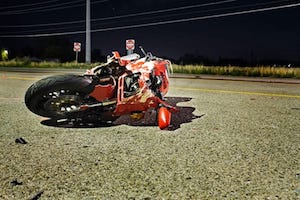
Each year, thousands of people are involved in motorcycle accidents, and sadly, many of these people are seriously injured or killed.
In fact, according to the National Highway Traffic Safety Administration, 5,286 motorcyclists died as a result of an accident in the U.S. in 2016. Add this to the 88,000 motorcyclists who were injured in 2015 (The latest year for which there are statistics.) and that makes motorcycles much riskier than cars. Moreover, motorcyclists are 28 times more likely to be killed in a crash than drivers and passengers in cars.
Many of these injuries and deaths are caused by the negligence of other drivers. Distracted drivers, drunk drivers, tired or inattentive drivers hurt and kill motorcyclists. That is where we can help.
At The Collins Law Firm, getting compensation for personal injury victims is what we do. Our motorcycle accident attorneys have spent decades aggressively protecting accident victims and their families, and we know what it takes to get you the full compensation you deserve. Moreover, you pay nothing unless you recover money, so there is nothing to lose. Call us at (630) 527-1595 or fill out out contact form for your FREE CONSULTATION and let us start fighting to get you justice right away.
What Should You do if You Have Been in a Motorcycle Accident?
Should You Hire a Motorcycle Accident Attorney?
How do Our Attorneys Fight on Behalf of Clients?
What Kinds of Motorcycle Accident Cases do We Handle?
What Types of Injured Motorcycle Accident Victims do We Represent?
What are the Primary Causes of Motorcycle Accidents?
What Risk Factors Make Riding a Motorcycle More Dangerous?
What Steps Should You Take to Stay Safer on the Road?
How do the Laws Regarding Motorcyclists Affect You?
Who can be Held Liable for a Motorcycle Accident?
What Damages Can You Recover in a Motorcycle Accident Lawsuit?
What Are the Motorcycle Crash Statistics in Illinois?
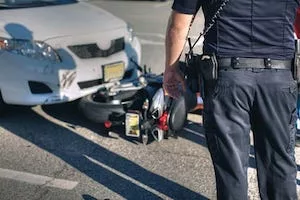
The minutes right after an accident are extremely stressful, however, there are some steps you should take to protect yourself, if you are able.
In fact, you may want to have a checklist of things to do after an accident in the glove compartment of your car. This can help if you are stressed and not thinking clearly.

Motorcyclists face unique challenges when they are involved in a crash with an automobile. First of all, motorcyclists are more likely than the driver of the car to be seriously injured, and then they face anti- motorcycle bias when they try to pursue a claim in court. Many American automobile drivers resent motorcycles and blame them for accidents because they are harder to see. In addition, negative cultural stereotypes give jurors the impression that motorcyclist are reckless, rough and disreputable. This false assumption leads them to believe that the motorcyclist was more likely to have caused the accident. In reality, motorcyclists are a very diverse group of people and the driver of the car is more likely to be at fault when a motorcycle and an automobile collide.
However, when motorcycle accident cases go to trial, injured motorcyclists typically receive smaller verdicts than automobile drivers with similar injuries. In addition, many insurance companies are more likely to 1) deny that the car was at fault and defend the automobile driver instead of settling with the injured motorcyclist, or 2) offer a smaller settlement amount.
For these reasons, it is critical that a motorcyclist who is injured in a crash that was caused by an automobile driver retain a motorcycle accident lawyer. At The Collins Law Firm, our experienced, aggressive motorcycle accident lawyers fight for the maximum compensation that Illinois law allows for motorcycle injury and fatality cases.
Whether you are hurt in a car accident, motorcycle crash, drunk driving accident or distracted driving crash, our lawyers can help you pursue compensation for your injuries and help you get back on your feet. As soon as our lawyers are retained by a motorcyclist who has been injured or by the family of a deceased motorcyclist, we begin aggressively preparing your case to help get you a favorable settlement. In a typical case (there are always exceptions), we will:
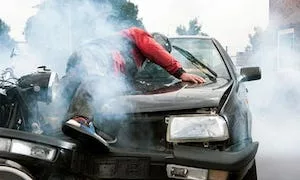
At The Collins Law Firm, we handle many different types of motorcycle accidents cases. These include:
The Firm represented a young woman who as a passenger on a motorcycle was thrown from the vehicle after a rear-end collision with an SUV. Our client sustained significant injuries including a herniated cervical disc that required surgery. The lawsuit was settled for the confidential policy limits.
We are currently representing a motorcyclist hit by a teen driver in Kendall County. The teen driver made an improper left turn which caused the motorcycle to collide with the vehicle’s passenger side. The motorcyclist was knocked unconscious and suffered facial trauma and multiple head injuries. This case involves the teen driver’s insurance policy as well as the motorcyclist’s underinsured driver policy.
Many injuries resulting from motorcycle accidents are very serious and can result in hospitalization, surgery and/or months of medical treatment or rehabilitation. Some even cause permanent damage. People with injuries like these may well have a significant motorcycle accident claim and should have legal representation. The types of injuries that we see in our clients include:
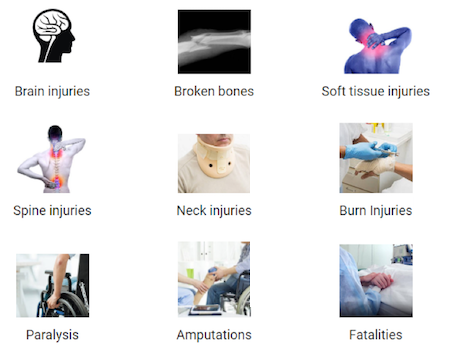
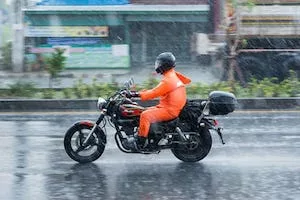
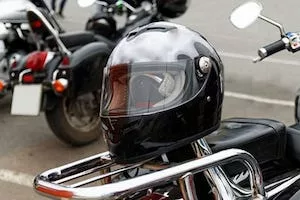
Motorcyclists must have a special driver’s license. You cannot drive a motorcycle with a regular driver’s license. The requirements vary from state to state, but usually, motorcyclists must take special training classes that teach them the basics of handling and riding a motorcycle and then pass a written and driving skills test. In Illinois, you must pass a written test and a rider skill test to get a motorcycle license. However, if you are 18 or older; have a valid driver’s license and have passed an IDOT approved motorcycle training course, you are exempt from this requirement. If you are in an accident and do not have a valid motorcyclist’s license, this will hurt your case.
Some States Require a Helmet when riding on a motorcycle. Nineteen states across the country--but not Illinois--require that all riders wear a helmet. Some states require helmets for younger riders. Be aware of the requirements in your state, and check the laws when riding outside of your home state.
Motorcyclists may be required to wear other protective gear. These laws also vary from state to state and may require riders to wear protective eye wear or padded clothing. In Illinois, eye protection is required for riders of all ages. This protection can consist of glasses, goggles, a wind screen or windshield. Check the requirements in your state.
Motorcyclists may need special equipment on their bike. Some states require riders to equip their motorcycle with reflectors, turn signals or safety lamps. Motorcycles in Illinois must have a passenger seat and footrest for any passengers, a muffler and one side-view mirror. Helmet speakers are only allowed for communication, not entertainment.
Motorcyclists are not allowed to lane-split. Lane-splitting is a term for riding between two lanes of traffic, and it is illegal in every state except California.
Prohibitions in Illinois. State law prohibits handgrips above head height of the operator, riding no-handed, and riding on one-wheel—also called doing a wheelie.
The other driver. There are various parties who may be liable in a motorcycle accident. First and foremost is the driver of the other vehicle. If that driver has caused harm to a motorcyclist, then the motorcyclist’s attorney will file a claim against the other driver’s insurance company.
The agency constructing and maintaining the roads. If the road conditions caused the accident, a motorcyclist may sue the agency responsible for building or maintaining the road. So, even if no other cars were involved, you still may have a case. Missing or faulty traffic signals, potholes, blind corners, and uneven surfaces: all of these can cause a motorcycle accident. However, if you are planning to sue a government agency, be aware that the statute of limitations may be very short, so do not wait.
The motorcycle manufacturer or designer. If the crash was caused by some problem with the motorcycle itself, you may be able to sue the designer or manufacturer of the bike. These lawsuits are product liability lawsuits and work differently than typical motorcycle accident cases. They fall into two categories: 1) manufacturing defects and 2) design flaws. A good motorcycle accident attorney will know who to sue.
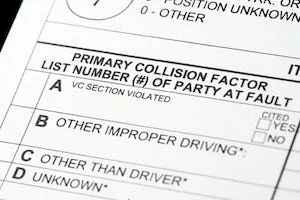
There are four elements to a negligence lawsuit: duty, breach, harm and causation. All drivers have a duty to drive safely and follow the rules of the road. If a driver breaches this duty and causes an accident, he or she may be liable for damages. This can be easy to determine in simple cases where a driver broke a traffic law, such as ignoring a stop sign. At other times this can be more difficult to determine, for example, when you are trying to prove that the defendant did not act like a "reasonable person" and drive with care. Occasionally, the other driver’s behavior was so risky that they are charged with recklessness. An example of this would be an accident involving a drunk driver, and in such a situation you might be entitled to higher damages. Finally, the accident resulting from a breach must be determined to have caused harm to the plaintiff for a case to be filed.
Shared fault: What if both the motorcyclist and the other party were at fault? Maybe there were several factors involved: perhaps a speeding motorcycle and a car who made an unsafe turn. In these situations, the percent that each driver was at fault will be determined. At this point the legal standard of comparative damages comes into play, and individuals who are partly responsible for an accident receive damages at a reduced rate based on the percentage that they are at fault. For example, if the motorcyclist was 30% responsible for an accident, he or she will only be able to collect 70% of the damages. Of course, if a motorcyclist is responsible for over 50% of the accident, he or she will not be eligible for damages and may be sued.
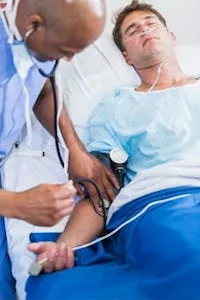
There are three types of damages that can be recovered in any accident:
According to the Illinois Department of Transportation, motorcycle crashes accounted for only 1.1 percent of all crashes in Illinois in 2016, however, motorcycle fatalities accounted for 14.3 percent of all motor vehicle accident deaths. Sadly, 154 motorcyclists were killed and 2,692 more were injured--including 943 serious injuries—in the state in 2016. The following maneuvers were involved in the crashes:
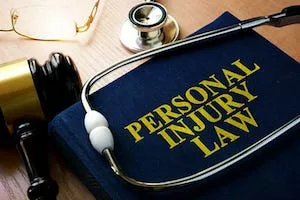
All too often, drivers fail to look out for motorcycles on the highway and city streets. This is especially true in Illinois. If a driver has cut you off or turned straight into your bike, we can help you recover the money you are entitled to. Not only can we help get the compensation you need to fix your motorcycle, but we can also help you recover any lost wages and money needed to pay for medical bills.
We also assist our clients who have lost loved ones due to a fatal motorcycle accident. Recovering emotionally should be your top priority; allow us to shoulder the legal burden so you can begin to move forward with your life.
If you are in an accident, it is important to obtain legal representation quickly so your attorney can gather crucial evidence. Contact The Collins Law Firm today at (630) 527-1595, extension 221 for Shawn Collins or extension 226 for Edward Manzke, to schedule a free consultation with an experienced member of our legal team.
For More Information, Read Our Motorcycle Accident Blog.
"*" indicates required fields











Chris G. was very professional and helpful!